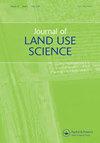城市土地利用转型对生态系统服务的影响:对中国城市规划的启示
IF 3.3
4区 环境科学与生态学
Q1 AGRICULTURE, MULTIDISCIPLINARY
引用次数: 0
摘要
伴随着城市化快速发展的城市土地利用转型对当地生态系统产生了明显的负面影响。利用高分辨率Landsat Thematic Mapper (TM)数据,对1990年、2000年和2010年中国中部最大城市武汉的土地利用动态格局进行了研究。基于单位面积等值法,并对Xie et al.(2015)的单位参数进行了修正,探讨了武汉市生态系统总服务价值、动态特征和空间特征。结果表明:1990 - 2000年及其后10年,武汉市生态系统服务价值呈持续下降趋势;减少的主要原因是城市扩张。2000 - 2010年武汉市生态系统服务价值下降幅度较小,城市扩张速度明显快于前10年。结果表明,城市发展严重影响了池塘、河流/湖泊对其自然提供的生态系统服务的贡献。池塘和河流/湖泊对城市生态系统服务做出了重要贡献,即使面积很小。农田对城市扩张空间的贡献很大,对食物供应和养分循环维持等相关生态系统服务的损失也很大。其次是林地,对气候调节、土壤保持和废物调节有重要贡献。土地利用结构和配置的优化可以改善城市生态系统服务。本文认为,虽然强调了生态资源保护意识和可持续发展规划,但在实践中仍面临挑战。将生态系统服务动态与城市规划相结合是中国大城市在快速城市化进程中实现可持续发展的重要途径。本文章由计算机程序翻译,如有差异,请以英文原文为准。
Effects of urban land use transitions on ecosystem services: Implication on Chinese urban planning
Urban land use transitions along with the rapid urbanization development cause obvious negative effects on the local ecological system. This paper explored the dynamic patterns of land use in central China’s largest city Wuhan, using high-resolution Landsat Thematic Mapper (TM) data in 1990, 2000 and 2010. The aggregate ecosystem services value, its dynamics, and spatial features were discussed based on the equivalent value per unit area approach, with the revision of Xie et al.’s (2015) unit parameters, adapted to Wuhan’s local situation. The results indicated that Wuhan’s ecosystem services value had been experiencing a continuous decrease during 1990 and 2000 and the following decade. The decrease was mainly due to urban expansion. However, Wuhan’s ecosystem services value decreased less between 2000 and 2010 with a much faster urban expansion pace than those in the former decade. The results illustrated that urban development severely affected ponds, rivers/lakes in their contribution to the ecosystem services that they naturally provided. Ponds and rivers/lakes contributed importantly to urban ecosystem services, even with a small proportion of area. Farmland contributed highly to urban expansion space as well as highly to the loss of related ecosystem services such as food provision and nutrient cycle maintenance. Forest land followed with an important contribution to climate regulation, soil conservation and waste regulation. The optimization of land use structure and configuration could improve urban ecosystem services. The authors conclude that even though the awareness of ecological resources conservation and sustainable development planning is emphasized, the practices are still in a challenge. The integration of ecosystem services dynamics to urban planning is an essential way that the large cities of China can realize sustainable development during its rapid urbanization.
求助全文
通过发布文献求助,成功后即可免费获取论文全文。
去求助
来源期刊

Journal of Land Use Science
Environmental Science-Management, Monitoring, Policy and Law
CiteScore
5.40
自引率
6.20%
发文量
26
期刊介绍:
The Journal of Land Use Science provides a central outlet for high-quality articles on theoretical and empirical aspects of land-use science at the interface of social and environmental systems. The Journal brings together an array of research perspectives at multiple temporal, spatial and social scales that contribute a better understanding of land-system dynamics and communicate scientific advances towards attaining land-system sustainability.
 求助内容:
求助内容: 应助结果提醒方式:
应助结果提醒方式:


